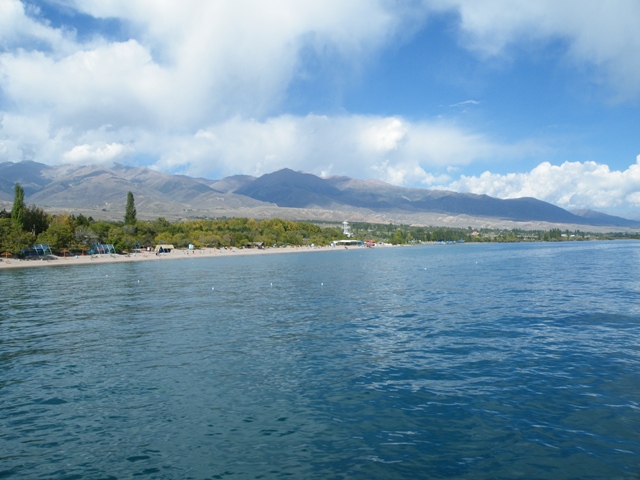
On Wednesday, 18 April, in Bishkek, the seventh meeting of the Steering Committee of the National Policy Dialogue on Integrated Water Resources Management approved work towards a River Basin Management Plan for the Chu River Basin and endorsed the outcome of a baseline study, which will serve as a basis for targets and a programme of measures on water and health in Kyrgyzstan. These outcomes are a significant step in addressing issues such as pollution of the Chu River, as well as the quality of drinking water, and its subsequent health impacts.
Under the National Policy Dialogue, steps are taken to apply the principles of integrated water resources management embedded in the national Water Code. As part of these efforts, a river basin management plan is under preparation for the Chu River Basin. The waters of this transboundary river, fed mainly by glaciers and melting snow, are heavily used for irrigation in both Kyrgyzstan and Kazakhstan. Untreated industrial and municipal wastewaters, animal husbandry, mining and unauthorized waste disposal close to settlements exert additional pressures on water resources. The work on the River Basin Management Plan, approved by the Steering Committee, envisages a comprehensive approach to managing water quantity and ensuring water quality and protection of ecosystems. It also stresses the need for coordination of efforts with Kazakhstan on this transboundary basin.
Another major decision of the Steering Committee endorsed the outcome of a baseline study, which is at the root of setting of targets and the drawing up a programme of measures on water and health in Kyrgyzstan on the basis of two pilot projects: one on the Chu River Basin, the other on the Issyk-Kul Basin. These activities improve coordination of efforts of the health, water and environmental sectors in achieving effective protection of water resources used as a source of drinking water. The work builds on the Protocol on Water and Health — an international legal instrument which aims to attain safe drinking water and adequate sanitation for everyone. As a non-Party to the Protocol, Kyrgyzstan is also using other opportunities and mechanisms provided under this instrument, such as capacity-building of operators of water supply and sanitation facilities and provision of information to the general public.
The meeting, which brought together over 40 representatives of governmental institutions, international organizations, non-governmental organizations and other stakeholders to discuss key issues of water policy in Kyrgyzstan, was organized by the United Nations Economic Commission for Europe (UNECE) and the Organization for Economic Cooperation and Development (OECD) in cooperation with the Kyrgyz authorities in the framework of the European Union Water Initiative.
The Dialogue process is particularly important for Kyrgyzstan, as during the past decade the national water and environmental authorities have changed their status several times as the result of governmental reforms and restructuring, hindering their ability to initiate policy reforms and pursue intersectoral cooperation. Since 2008, the National Policy Dialogue and its inter-agency Steering Committee have provided a platform for governmental agencies and other stakeholders in Kyrgyzstan to discuss water policy at national and river basin levels, as well as cooperation on water with Kazakhstan and Tajikistan.
The National Policy Dialogue in Kyrgyzstan is led by the Department of Water Management and Melioration of the Ministry of Agriculture and Melioration. The activities are implemented with support from the European Commission and the Governments of Finland and Norway.
For further information please visit: http://www.unece.org/env/water/npd
Contact information: [email protected]
Note for Editors:
National Policy Dialogues on integrated water resources management (IWRM) and water supply and sanitation (WSS) are the main operational instrument of the European Union Water Initiative (EUWI) Component for Eastern Europe, the Caucasus and Central Asia. The EUWI was launched at the World Summit on Sustainable Development in Johannesburg (2002). UNECE is the strategic partner to support the policy dialogue process on IWRM, whereas OECD is the strategic partner for WSS and financial aspects of IWRM. National Policy Dialogues are under way in the following countries of the region: Armenia, Azerbaijan, Georgia, Kyrgyzstan, Republic of Moldova, Russian Federation, Tajikistan, Turkmenistan, and Ukraine.
The UNECE/WHO-Europe Protocol on Water and Health to the Convention on the Protection and Use of Transboundary Watercourses and International Lakes (Water Convention) is the first international agreement adopted specifically to ensure, by linking water management and health issues, the adequate supply of safe drinking water and adequate sanitation. Twenty-five States are Parties to the Protocol.